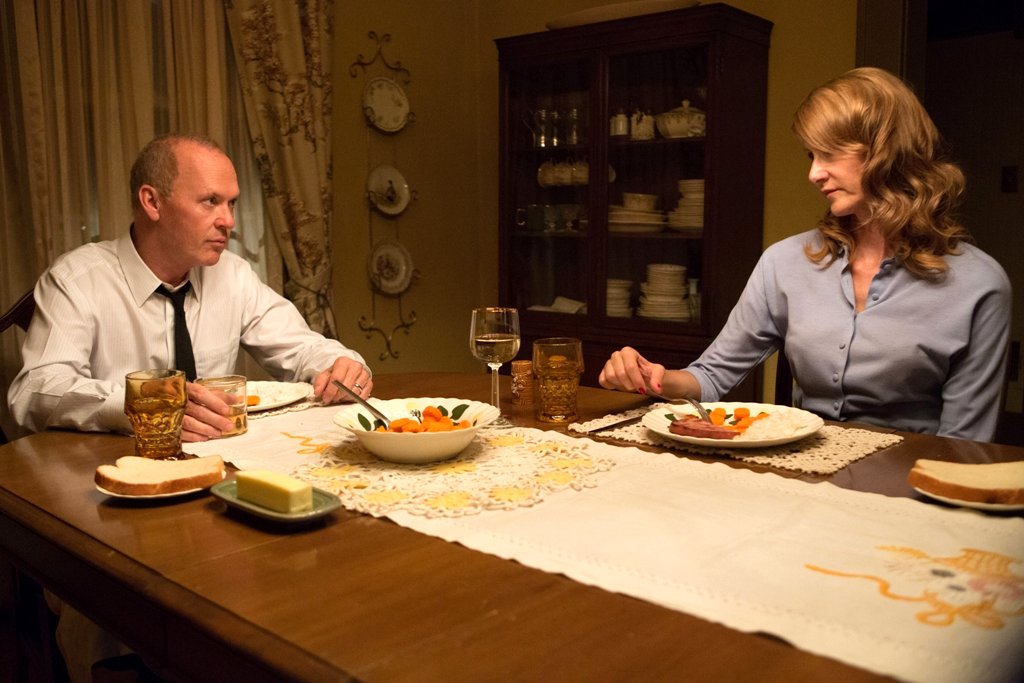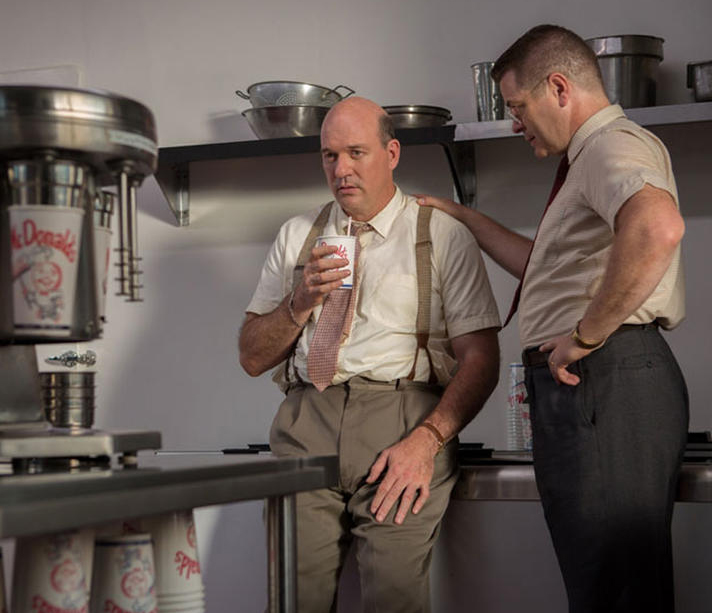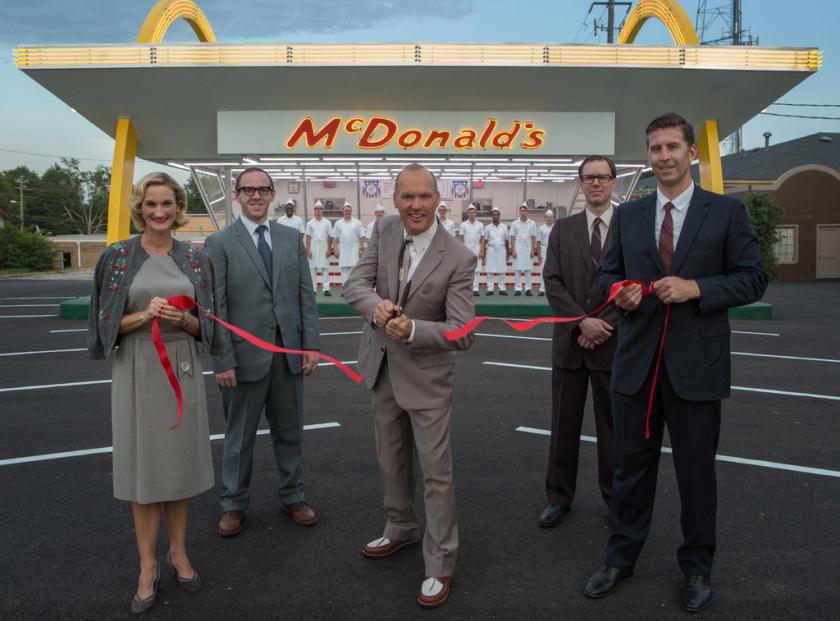Last year we had Jennifer Lawrence as the queen of the QVC shopping channel in Joy. For 2017, here’s Michael Keaton as Ray Kroc, a struggling travelling salesman who went on to become the driving force behind the McDonald's fast-food empire. I’m looking forward to seeing George Clooney as Colonel Sanders.
Meanwhile, it’s difficult to pin down this film's objectives with certainty. Director John Lee Hancock and screenwriter Robert Siegel seem to want to celebrate the fine old American virtues of self-reliance, ambition and hard work, while simultaneously depicting Kroc’s progress as a form of soul-shrivelling damnation. Praise and burial walk hand in hand. You can’t really fault Keaton, who vividly and remorselessly projects the obsessiveness, cussedness and raging ambition that must fuel real-life characters like Kroc. The earlier passages of the movie, where he’s just a struggling schmuck wearing out tyre-rubber while trying to sell a multi-headed milkshake maker to totally indifferent restaurateurs scattered along the highways of the Midwest, successfully evoke an archetypal 1950s America where the men dreamed of playing golf with Bing Crosby and their wives kept immaculate homes in leafy suburbs. The reality was frequently more like Death of a Salesman, and Kroc spends demoralising periods of time in lonely motel rooms, listening to recordings of a motivational speaker extolling the crucial importance of persistence above all else. Back home, his wife Ethel waits patiently for a little me-time with her husband in the brief interludes between his sales trips, having evidently put up with years of his half-baked schemes for selling all kinds of crackpot merchandise. Laura Dern (above, with Keaton) plays Ethel with a skilfully-etched sense of stoical hopelessness, before she becomes one of the numerous casualties of her husband’s burgeoning megalomania.
The reality was frequently more like Death of a Salesman, and Kroc spends demoralising periods of time in lonely motel rooms, listening to recordings of a motivational speaker extolling the crucial importance of persistence above all else. Back home, his wife Ethel waits patiently for a little me-time with her husband in the brief interludes between his sales trips, having evidently put up with years of his half-baked schemes for selling all kinds of crackpot merchandise. Laura Dern (above, with Keaton) plays Ethel with a skilfully-etched sense of stoical hopelessness, before she becomes one of the numerous casualties of her husband’s burgeoning megalomania.
There’s a healthy dose of wry comedy in the way the McDonalds empire came about. Kroc, unable to believe that somebody in San Bernadino, California had called his Illinois office to order six milkshake machines, followed a hunch and drove out to the Coast. Here he discovered the McDonald brothers, Dick and Mac (Nick Offerman and John Carroll Lynch, pictured below, both note-perfect), who’d hit upon a visionary fast-food formula which allowed them to rush excellent hamburgers and fries from kitchen to customer in the twinkling of an eye, by doing away with such expensive and time-wasting fripperies as plates, cutlery, tables, chairs or roller-skating waitresses. Kroc, having endured all kinds of terrible service and unspeakable food on his travels, is impressed.
 The message to business studies students everywhere is to think wider and bigger and never take no for an answer. The McDonald brothers had created a unique product, but its true potential was held back by Dick’s pernickety obsession with minute detail. The scene where he choreographs the cooking, ordering and serving routines of his restaurant by drawing plans in chalk on a tennis court is a time-and-motion masterpiece, “a symphony of efficiency” as he puts it.
The message to business studies students everywhere is to think wider and bigger and never take no for an answer. The McDonald brothers had created a unique product, but its true potential was held back by Dick’s pernickety obsession with minute detail. The scene where he choreographs the cooking, ordering and serving routines of his restaurant by drawing plans in chalk on a tennis court is a time-and-motion masterpiece, “a symphony of efficiency” as he puts it.
Kroc, on the other hand, saw the potential of rolling out a franchising operation nationwide, and the McDonalds’ angry objections about poor quality control made them look like the kind of people who said the smartphone would never catch on.
The McDonald brothers had a great idea, but Kroc dared to dream. And it was an American dream. Seeing Dick’s hesitant early try-out of the now-emblematic golden arches, Kroc is seized with a cosmic vision of McDonald's reaching from sea to shining sea, “the new American church”. It’s just unfortunate that his dream comes to mean ruthless business practices and a willingness to screw anybody who stands in his way (“it’s dog eat dog and rat eat rat,” he argues). When he meets smart young businessman Harry J Sonneborn (BJ Novak), who points out that what he should really be doing is buying and leasing out the land the Mickey D restaurants are built on instead of scraping a few cents off every hamburger sold, corporate domination is only a matter of time.
Perhaps the message is “you are what you eat.” For a large chunk of the running time, you might think you’re watching a left-field comedy. Then as the conclusion approaches, the mood darkens and Kroc changes from a whimsical Don Quixote with a fast-food fixation into a monster of mega-capitalism. At the end of the day, the aptly named Kroc ate everybody else’s lunch.















Add comment